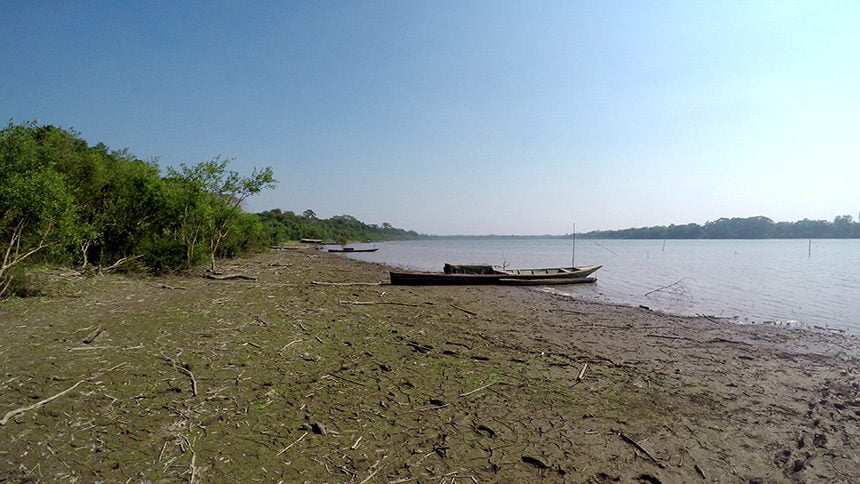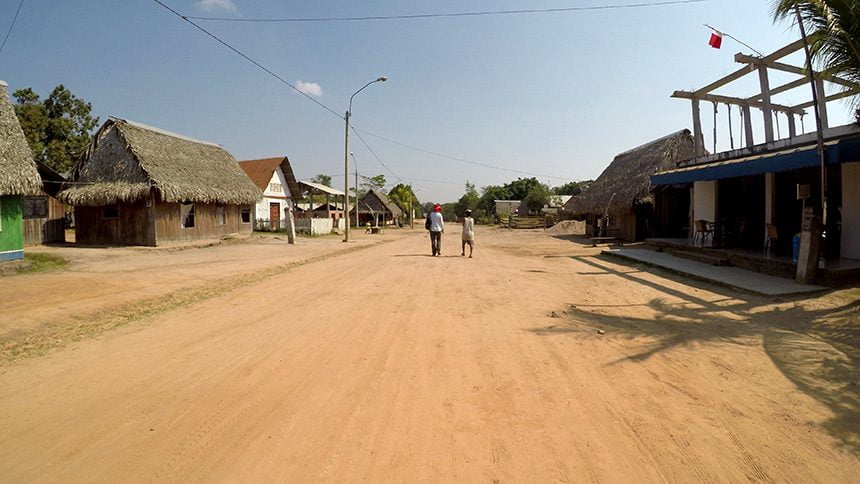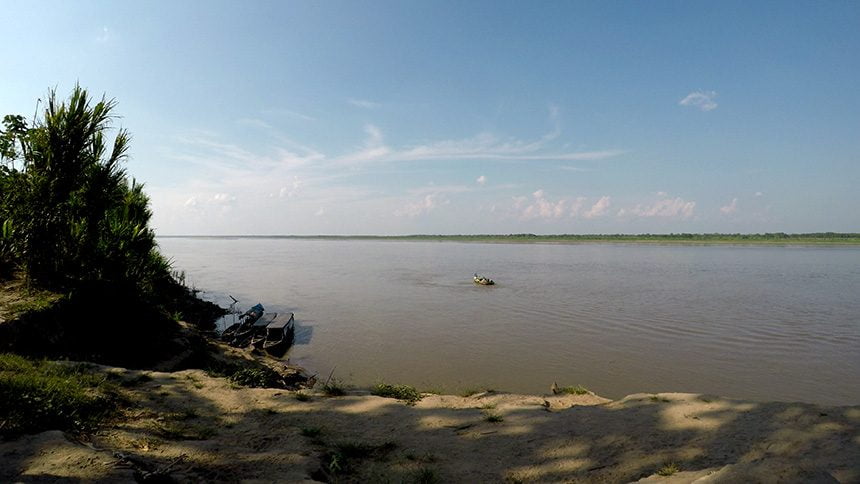Welcome to Ucayali (Pucallpa)!
Sights
Main attractions in the city
Modern construction with abundant greenery. Highlights include a 25-metre high obelisk, a central ornamental fountain, a further three fountains at each end, a row of flags, as well as sculptures made from granite, sand and cement that represent the customs of the mestizo settlers and the region’s indigenous peoples. Visitors can enjoy the monument created in honour of Colonel Pedro Portillo Silva, promoter of progress in the Peruvian Amazon. The Municipal Palace is located on the corner, with its transparent polycarbonate dome and terrace viewpoint boasting a stunning panoramic view.
Opened in December 2006, the church is also known as the Cathedral of the “Immaculate Virgin”, patron saint of the city of Pucallpa. In an Ojival – neo-Gothic style, it was built using local wood and Spanish porcelain. Its 14-metre high bell tower features 3 bells brought over from Italy, with a roof covered in 1375 tiles baked to have the colours of copper and aluminium, giving the roof an appearance similar to an “aguaje” shell (a tropical fruit). Among the highlights at the base of the central nave are 8 iron arches, carvings and stained glass windows made by the craftsmen of the Don Basco Chacas Handicraft Co-Operative (Áncash). The main entrance is carved from wood and in high relief, and displays scenes that depict the teachings of Jesus, the Virgin Mary and his disciples. A 6-metre high cross with a full-body image of Christ, weighing one tonne, can be seen on the high altar. The cathedral is decorated with wood carvings representing the 15 mysteries of certain moments in the lives of Jesus and the Virgin Mary.
The first plaza in Pucallpa city, built between 1950 and 1951. Known as Plaza del Reloj Público (Clock Tower Plaza). Highlights include the monument to the Peruvian naval hero Miguel Grau Seminario and a large clock that crowns the 25-metre tower with geometric lines, representing the Yine (Piro) ethnic group. The tower is decorated with stained glass depictions of mythical characters from the region: mermaids, river dolphins, a ghost ship, the chullachaqui devil, and the runamula, among others. The site features three pools and a viewpoint from which the majestic Ucayali river can be seen.
Created to protect and preserve various species of wild Amazonian flora and fauna, including monkeys, lizards, jaguars, deer, peccaries, the Central American agouti, otters, herons, toucans, parrots and other species that are either at risk or endangered. Visitors can see timber, medicinal and tropical fruit trees. The area has two lagoons where visitors can take boat trips to see Amazonian fish and aquatic plants. Among the highlights is Monkey Island, located in the centre. At the rear is the Regional Museum, which holds typical species of Amazonian fauna and a large collection of fossils discovered in the Ucayli, Pachitea, Aguaytia and Urubamba rivers. One of the most astounding pieces is the 10 million-year-old jaw of a Legarto Rex or Megatherium. Various cultural displays are exhibited in another hall, including Shipibo ceramic pieces from different periods, as well as paintings and sculptures by regional artists.
Boasting warm and calm waters, it is an ancient meander of the Ucayali river, created by a change in its course. In the rainy season, the lake joins the Ucayali river through a system of channels, producing a great wealth of fish and allowing its waters to be renewed on a regular basis. The lake provides opportunities for fishing, water skiing, swimming and rowing, as well as watching birds and fresh-water dolphins. At its main dock, located in Puerto Callao, boats can be hired to visit the settlements of the Shipibo ethnic group. Highlights include the native communities of San Francisco, Santa Clara and the 11 de Agosto hamlet, where baskets, purses, hats, bread boxes and a large variety of useful articles made from woven natural fibers including “caña brava” (wild cane) and plantain skins are made. Regional cuisine can be sampled all around the lake, and there are also lodges, hostels and restaurants. La Restinga Beach is popular during summer.
Main attractions beyond the city
A tectonic lagoon which, due to its abundance of fish, is perfect for fishing as well as boat trips and camping. Various communities of the Shipibo-Conibo ethnic group live on its shores, like Santa Teresita and San Salvador. The Cashibo-Cocha canal connects to the Yarinacocha lagoon.
Its name comes from the Imiría, a floating plant with a reddish yellow flower which, along with lotuses and putuputo plants, covers a large part of the shores during flood seasons. Produced by tectonic processes, the lake features aquatic plants that form floating islands moved by the wind, creating beautiful changing landscapes. Ideal for fishing and canoe and boat trips. There are numerous entrances into the earth known as “undercurrents”. Various mestizo and native communities from the Shipibo-Conibo ethnic group have settled on the shores, the most interesting being Junín Pablo and Caimito.
Created using traditional damming techniques between 1970 and 1975, when immigrant colonies of Japanese farmers and livestock breeders settled in the area. Hydro-biological species abound in the area, as do extensive fields of pepper and citrus fruits and cattle farming areas.
Two 800-metre suspension bridges cross the Aguaytía river. One of these was built between 1939 and 1942. From a modern esplanade, visitors can watch traditional vessels arriving or departing from the different native communities of the Kakataibo and Shipibo-Conibo ethnic groups. The landscapes are typical of the jungle fringe area, with steep-sloped narrow and deep valleys. In the distance, part of the Cordillera Azul or Blue Mountain Range can be glimpsed.
It reaches the Cordillera Azul or Blue Mountain Range (so-called due to the apparent colour of the mountains when seem from a distance.) A unique pass eroded by the Yuracyacu river, a tributary of the Aguaytía river, which has rock walls that are over 100 metres high. Along this two-mile corridor there are around 70 waterfalls of cold and crystal clear water, with the most powerful being the Velo de la Novia (Bride’s Veil) and the Ducha del Diablo (Devil’s Shower). Visitors can see rock paintings, while the cloud forests house unimaginable bio-diversity. The Boquerón was discovered in 1757, by Father Francisco Alonso de Abad.
Modern construction and the site of the statue of the indigenous leader Juan Santos Atahualpa, who is believed to have spent his last days in the area. Designed with cement sculptures that represent the various ethnic groups of the Atalaya, all surrounded by beautiful ornamental plants. Nearby are the San Antonio de Padua Cathedral, public institutions, banks, restaurants and shopping centres. Close by, the esplanade of the city of Atalaya can be glimpsed, as well as the chapel of the Franciscan Monks. Agricultural fairs are held each Sunday.
An underground river, approximately 5 kilometres long. The water springs from holes among immense rocks, within a 30-metre radius. It has a winding course, is between 5 and 8 metres wide, with a depth that varies between 0.5 and 1.5 metres. The water is fresh and crystal clear, with a temperature that varies between 12°C and 16°C, and there are igneous rocks covered in lush vegetation. The waters are used to generate energy, through the mini Hydro-Electric Power Station in Canuja, and are the source of drinking water for Atalaya. Visitors can also see Canuja stone monoliths, with carvings similar to river shells, stars, suns and lakes.
It is a 6-tonne monolith, which is 5 metres long, 2 metres wide and 2 metres tall, linked to pre-Inca or Inca cultures. In the surrounding areas, stone axes have been found, which are thought to date back to pre-Inca times. Surrounded by lush vegetation and a thick forest. The monolith has carved figures all over it. The head resembles a bull baring its teeth, eyes and nose. The body contains some symbols that have yet to be deciphered. In 1995, the archaeologist Federico Kauffman, accompanied by Peruvian and foreign researches, confirmed its pre-Inca origin. The carved signs are orientation points that point directly to Cusco. An x, three figures representing the Sun, a human left hand, and clefts on different parts of the body all bear similarities to the remains of the Chavín civilization.
Known by the locals as the “Waterfall of the Quinceañera (15-Year-Old Girl)”, it has two leaps: one over a cave and one over the sides of a 20-metre high cavern. It has a stepped form and is surrounded by abundant vegetation.



